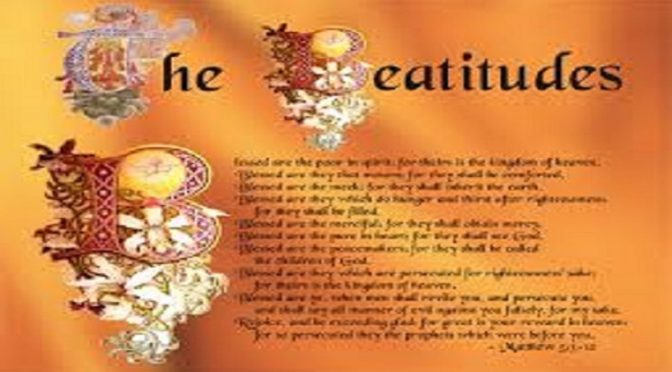Contents
Introduction
Last Sunday we heard Jesus call Peter to be his disciple after teaching them how to dig deep and win souls for God. afterwards, Jesus travels with Peter and the other disciples. Luke reports acts of healing (a person with leprosy and a paralytic man) and the call of Levi, the tax collector. Jesus also replies to questions from the Pharisees regarding fasting and the observance of the Sabbath. In the preceding verses, Luke documents the choosing of the twelve apostles by Jesus from among his disciples, whom he called apostles Apostle is a Greek word that means “one who is sent.” This Sunday gospel reading is the famous Sermon on the Plain. The parallel passage is found in Matthew 5:1–12. While the Lukan version is called Sermon on the Plain, that of Matthew is designated as the Sermon on the Mount. Besides the titles.…
On the beatitudes
While Matthew has nine beatitudes, Luke has only four. Again, to the four beatitudes, Luke presents also four woes. The English term beatitude is a translation of the Greek word makários. In our context, the word blessed (makários) could be translated as happy, fortunate, privileged, or favoured. “And Jesus lifted up his eyes on his disciples, and said: Blessed are you poor, for yours is the kingdom of God” (Luke 6:20). That is, blessed or happy are those of you that are my disciples and who are (materially) poor, for the kingdom of God belongs to you. By specifying that Jesus lifted his eyes on the disciples, Luke underlines an important aspect: that Jesus wanted his disciples to listen attentively because what he is about telling them needs serious commitment and undivided attention. This is the kind of attention and commitment that are required of us, whenever we are reading or listening to the word of God. Every form of distraction should be avoided even when we pray, for in praying, we equally make use of the word of God.
Who are the Poor?
When the Bible says the poor, who and who are being referred to? In our Nigerian society, when we say that a person is poor, what do we mean? In the Hebrew (Old) Testament, the poor referred to the pious poor who looked unto God and depended on Him for survival. Probably, it is because of the adjective ‘pious’ attached to the poor that makes Matthew say poor in the spirit. In the Bible and in the Second Temple literature, the noun ‘poor’ refers not only to those lacking material wealth, but also to widows, orphans, the powerless, the oppressed, and the needy members of society. Like the poor, widows and orphans (cf. Isa 10:2) are among those whom God gives victory over the powerful (cf. Isa 61:6). These poor, meek, and powerless individuals.…
Conclusion
Taking Luke and Matthew together, those blessed are the poor in spirit; those who mourn; the meek; those who hunger and thirst for righteousness; the merciful; the pure in heart; the peacemakers; those persecuted for righteousness; and those insulted, persecuted, and falsely accused. Speaking about eternal life and the need to live correctly to be admitted by God in his presence, Paul reminded and informed the Corinthian Christians, and the Nigerian Christians as well that “…we must all appear before the judgment seat of Christ, so that each one may be paid back according to what he has done while in the body, whether good or evil” (2Cor 5:10). ‘According to what we have done in the body’ means while we lived here on earth. The beatitude is the explanation and application of the words of Paul we have just cited. In and with the beatitude, each person will be rewarded accordingly. Note that the word blessed (makários) implies happiness, satisfaction, felicity, joy, health, and well-being. Originally, it meant free from daily cares and worries.
FOR DETAILS, GET YOUR OWN COPIES OF THE BOOK “THE WORD OF LIFE: SUNDAY REFLECTIONS” (vols. I‑II-III)!! The reflection for the 6th Sunday of the year © is found in vol. III pages 118–130. Happy reading!
For details on how to get it, contact the author on this link: https://m.me/uchennabiblia?fbclid=IwAR2yeg4a6sDGBp9QGkIvKj6FSADumMokN6lshdE0zuo-JHs6qOmlhA7jyHo or email me at: postmaster@uchennabiblia.com or simply send an SMS on 08116100926, and I will get back to you.

